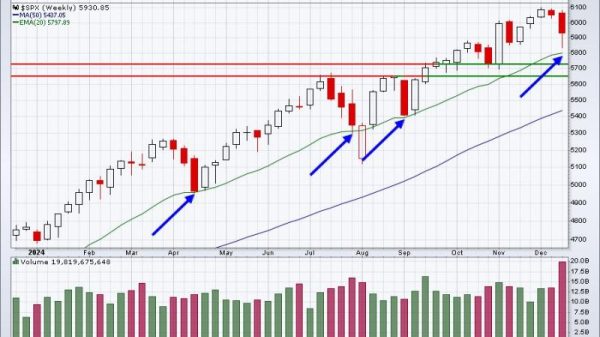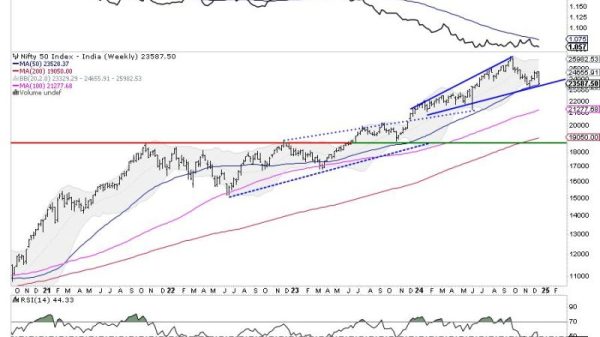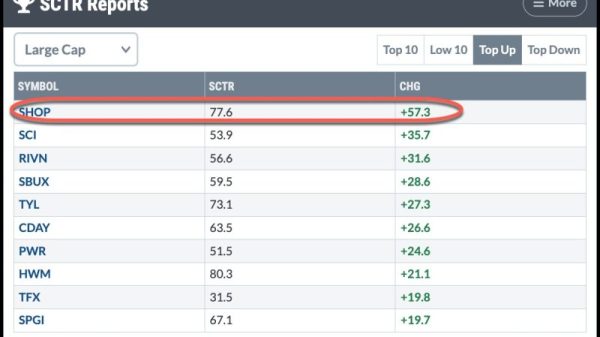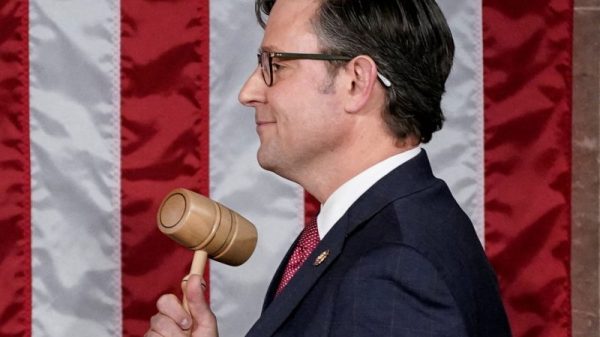One of the perks of being speaker of the House — or at least, one of the characteristics of it — is that you are the subject of an awful lot of attention.
Do a Google search for the name “Kevin McCarthy,” for example, and you see there are 27.7 million results. Search for “Nancy Pelosi” and you get 16.4 million. Maybe not a measure of popularity (as McCarthy might attest) but presumably one of influence.
On Wednesday afternoon, the House elected a new speaker, filling a vacancy that opened up three weeks ago with McCarthy’s ouster. And, within a few hours of the speaker being elected, we observed something remarkable: He already generated an astounding 52.9 million Google search results — nearly twice as many as McCarthy.
This is not because the new speaker, Mike Johnson (R-La.), is twice as popular as McCarthy or twice as influential. It is because his name — like so many other Americans — is Mike Johnson.
The political data firm L2’s index of registered voters in the United States indicates that some 18,600 of them are named “Mike Johnson” or “Michael Johnson.” It’s an unusually large number, certainly — in large part because “Michael” and “Johnson” are among the most common first and last names in the country.
To be fair, “Michael” used to be more popular. Last year, data from the Social Security Administration put “Michael” 16th on the list of the most popular names given to boys, just behind “Jack” and just in front of “Alexander.” No. 1 was “Liam.”
But, as you might know, Johnson wasn’t born in 2022. He was born a half-century before, in 1972. And that year, the most common first name for boys born in America was … “Michael.”
(Unlike in 2022, “Kevin” also cracked the top 100.)
You’ll notice that not only was “Michael” the most popular name, it also made up a much larger percentage of boys’ names that year than “Liam” did in 2022. Last year, the Atlantic’s Joe Pinsker explored this era’s embrace of unique baby names, meaning a greater diversity of names in general and, therefore, smaller percentages of the total going to any one name.
But there’s one specific reason that there was less diversity in baby names in 1972 than there is now: There was less diversity in the population. Immigration laws were loosened less than a decade before Johnson was born, allowing more new U.S. residents from other countries and increasing the number of baby names that have roots in other cultures and languages. The 11th most-popular name in the U.S. last year was “Mateo,” which didn’t appear in the top 1,000 in 1972.
So that’s the first name. But it is then coupled with “Johnson,” which, the Census Bureau tells us, was the second-most common last name in the U.S. in 2010, the most recent year for which data is available.
What this doesn’t tell us, though, is how common the combination is, how many “Mike Johnsons” there are relative to other names. It’s a question that’s more complicated than it might seem.
Writing for 538 back in 2014, Mona Chalabi and Andrew Flowers explored this same question about the commonality of names (though not Mike Johnson’s in particular). One complicating factor is that first and last names are not distributed evenly; that, for example, the first name “Mateo” is going to be paired with the last name “Garcia” more often than it will “Nguyen.”
The Census Bureau data tells us, in fact, that “Johnson” is disproportionately common among Black Americans relative to other last names. It’s second overall, after “Williams.”
There’s about a 1 in 3 chance that someone living in the U.S. in 2010 with the last name “Johnson” was Black, which Mike Johnson is not. There was about a 1 in 5 chance that someone with the last name of “Smith” would be Black; 7 in 10 “Smiths” are White.
Anyway, with the stipulation that we can’t easily know exactly how many “Mike Johnsons” there are in the country at the moment, we can create a grid comparing the first-and-last-name combinations of recent speakers to evaluate how exceptional “Mike Johnson” might be in its commonality, relative to other speakers. So, looking at last names in 2010 (for which we have the most recent data) and first names from 1972 (which is just about when people at the 2010 median age of 37 would have been born), we can plot recent House leaders relative to the most common first and last names in those years, “Michael” and “Smith.”
“Mike” and “Johnson” is an unusually popular combination. (Note that Newton “Newt” Gingrich isn’t shown, his first name not appearing among the 1,000 most-popular.) The next most-popular combination is “James/Wright,” the name of the guy who served nine speakers ago. Pelosi’s first name is compared to the most popular names given to girls, but her uncommon last name dooms her to the lower-left corner.
It’s possible that there were other speakers in American history with even more popular names in the moment. This is hard to judge, given the limits on our data about how many people had any given first or last name in history. Was the name “Langdon Cheves” particularly popular in 1814? Probably not, but we can’t say for sure.
What we can say is that “Mike Johnson” is certainly among the leaders — and perhaps the speaker with the most common name in history. At least until he’s ousted in a week and the Republicans elect House Speaker Liam Smith.
Lenny Bronner contributed to this report.





























